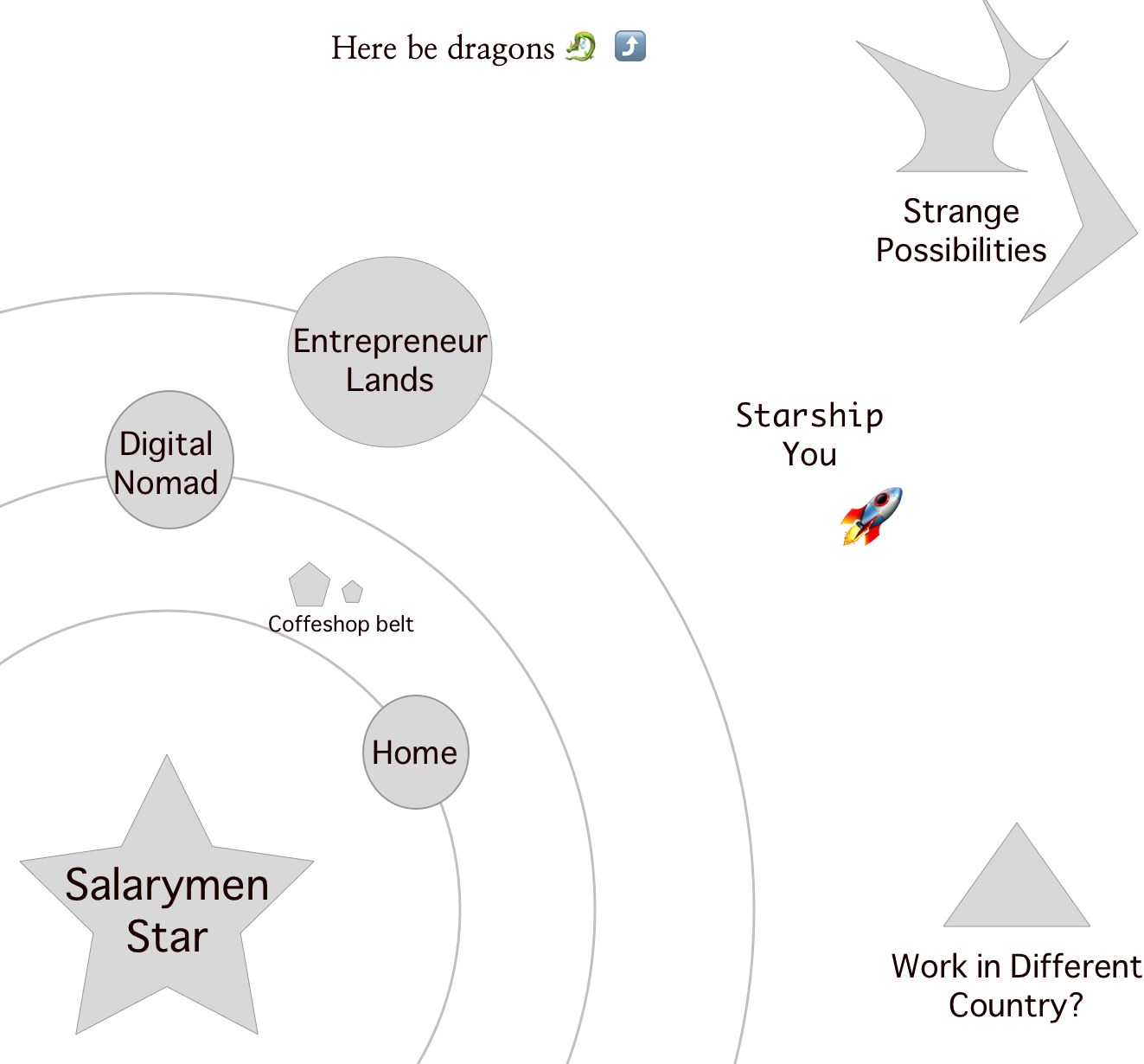August 29th, 2020: Greetings from Connecticut. August has been filled with family time as cousins and siblings have descended on my hometown to work remotely. Could this become an annual ritual? We will see!
This week is another guest post from the last person I met up with before the pandemic, Artur Piszek. I met up with Artur and his wife Maria in Tenerife in February. From Poland, they are both remote workers and have been quite creative in how they live their lives and I hope to cross paths with them again somewhere in the world!
One of the best things about living around the world is meeting people from different countries. Besides the jealousy of other countries’ health care systems, I love learning about how people approach and think about work and life. Many of the conversations about work online tend to be dominated by a very American view of what kind of life is possible. It’s always great to step outside that bubble.
On to Artur’s reflections on his journey over the past several years…
A Remote Work(er) Journey with Artur Piszek

This October, I will have 5 years of Remote Work experience. For the past 4, I have been sharing the journey with my liveaboard colleague and wife - Maria. We both work for Automattic - a 1000+ employee company that prides itself on making the Distributed work work.
I pursued the remote setup in order to get more life out of my years. I was fed up with sacrificing surfing lessons to sitting at the office and commuting instead of traveling the world.
If you want the same, my #1 advice is to be really careful where you attach your identity, especially if your transition is an abrupt one. With Google, Facebook, Amazon, and an impressive list of large companies extending their “emergency remote setup” well into 2021, a lot of us will get to try Remote Work.
If you want to guide your life and structure of your days more deliberately, you cannot just replace the office with another thing (say home or nomad lifestyle). Being deliberate means that there is no “plug&play package” waiting for you to open. Freedom means choice, but it also means you have to make a choice.
Salarymen
Working in an office of a larger company is a surprisingly uniform experience. You would expect it to differ quite a bit across cultures, but I have my doubts. If you haven't already, I highly recommend checking out Patrick McKenzie's adventures in doing business in Japan
The salaryman/employer relationship is best characterized as “You swear yourself to us, body and soul, and in return we will isolate you from all risks.”
- Doing Business in Japan
In the west, we like to make fun of total devotion that Japanese workers have for their careers, but are we really that different? In some countries, we fear for our jobs, because that dictates our health insurance or the ability to pay the next loan installment. In others - any “gap” in your employment history is suspicious, so people keep working long hours for 50 years, with only the prospects of retirement to keep them going.
That isn't to say there are no benefits - we have ample perks in the office: chef, gym, laundry service, sleeping pods... the perks - especially in the tech companies - seem ridiculous.
The company hereby promises the employee: Your company will provide structure and purpose for your life. You will be clothed in the company colors, literally and figuratively. You will be respected, inside and outside the company, as befits an employee of ours. You will be provided with benefits perfectly calibrated to allow you and your family to lead a middle-class Japanese life. Your children will go to as good schools as they test into. Your wife will be able to afford an annual trip to Hawaii with her girlfriends. - Doing Business in Japan
The Japanese are just like everyone else, only more so. and working in any larger company is Salarymandomlight. The company dictates where you get to live, what time you get to spend with your family and where should you spend more than half of your waking hours. In exchange, you get a comfortable middle-class life, assigned playmates (aka colleagues), and some purpose.
Fast forward to 2020.
You already know what happens. The global Remote Work experiment gets reluctantly launched and many of us lose their perks and their identities. No more private chef, gym, and an office to go to.
You are not an Office Worker (Salaryman) anymore. Without the office, who are you?
Identity 1: Worker-From-Home
The default occupational mode of 2020 is working from home. This is a pretty sweet deal and the lists of benefits have been widely circulated:
No commute
You get to eat lunch with your partner, get that Amazon package,
You get to spend more time with your kids
The above list has been repeated almost as often as the downsides in countless "contrarian" articles from the mainstream media:
New communication modes take some getting used to (usually phrased as “this doesn’t work”)
Work-life balance getting out of hand, trouble focusing after being stuck at home the whole quarter
You get to spend more time with your kids
All these challenges can be managed by taking breaks from working from home. Even while maintaining social distancing, there are other options that will give you a much-needed break - a workation, coffee shop, or a restaurant. If you are not a worker-from-home, you can be a person that works from home occasionally.
Identity 2: Digital Nomad
I will be honest - the prospect of traveling the world while working from exotic places was what prompted me to seek remote employment in the first place. My wife and I got to swim with Turtles in Mexico, seals in Cape Town and spotted sharks in Thailand. We got engaged in British Columbia and spent the honeymoon in a Japanese Onsen. Thanks to remote work, we have been at least a month in each of those places, taking our sweet time soaking in the local culture.
Everyone who gets to know us perceives us to be digital nomads, but we have an apartment in Warsaw (Poland) that we love. The perspective of traveling with our lives’ belongings sounds quite scary and uncomfortable, and we quite enjoy the change of pace once in a while. Home is much sweeter after a month on the road and the travel is more exciting after some downtime. But it seems like many people expect an all-or-nothing answer.
Identity 3: Entrepreneur
With the publication of 4 Hour Workweek, Tim Ferris coined the term “Lifestyle Design”. The idea is simple: you design the lifestyle you want and build a “lifestyle business” to fit around it:
You set your working hours (down to title 4hr/week)
Work smart instead of working hard
Outsource whatever you can, so you can live the life you want
I walked this line and it’s a tough balancing act because the identity of an entrepreneur is more about business growth than a comfortable life. I fell into the hustle trap:
Become an entrepreneur to live the life you want
Make sacrifices in order to get good at it
Now you are good at it, do more of that because this is what you do
Congratulations, you are a slave of your business.
Entrepreneur mindset appeals to me so much, that I consider myself an Intrapreneur in my organization. I found that entrepreneur identity for me is a ticket straight to 90 hr workweeks and the boundaries of salaried job description keep me from trying to do everything.
But I'm me. Why do I need a ‘worker’ Identity?
Bravo! Good News: You don't. Bad news: the world wants you to he one, so it takes deliberate effort to keep your identity small, navigating between different, "established", and "legible" modes.
The pull of new identity is also seductive - especially if you are becoming good (or even great) at something. It’s a powerful force that can help you, but also trap you in a mode of operation way longer than it serves you.
It’s like "Salaryman Lite", "Worker-From-Home", "Digital Nomad" and “Entrepreneur“ have a certain mass. The more you identify as X, the more gravity it produces. The more gravity it produces, the more effort it is to escape the identities' pull.
If you want to cherry-pick different flavors of life, you will have to steer the spaceship you to skim the atmosphere (or even land for a short while) in both of those planets and all the configurations in between - coworking spot, renting an office with a friend, coffee shops, museums, libraries, parks, you name it.

Despite the shorter commute, I don’t particularly enjoy working from home and have rented a co-working office prior to the pandemic. Truth be told, I’d rather be with my team in one building, exchanging jokes over coffee or goofing around in meetings.
The biggest benefit of Remote Work is that by uncoupling the physical location of your colleagues and you - it permits infinite configurations. Remote Work lets you structure your work around your life, and not the other way around. You can keep exploring and sampling the lifestyles and identities that tempt you because work seizes to be your main lens and limiting factor.
✅ I can work with world-class colleagues without leaving my family and moving to the Bay Area.
✅ I can spend time in exotic places without sacrificing my career opportunities
✅ I can visit my grandpa for lunch across town without asking for permission or really telling anyone
✅ I can enjoy a very flexible schedule while working in a big company and enjoying the safety of a salary
Counter-intuitively, newfound freedom is scary and people often deal with it by running straight into the gravitational pull of one of the identities I mentioned. If you can avoid that, the possibilities are well, boundless.

I am on a mission to find the missing Internet manual. On my site Deliberate Internet I explore how global consciousness reshapes society, economy, labor, and art. I focus on Remote Work, creating a healthy economy in the magical land of the Internet, and escaping the overwhelm.
Hey there. Paul again. I have two more guest issues coming up but I may send them mid-week so that I can get back in the writing groove. I’ll also be shipping a few podcasts soon. Stay tuned!




